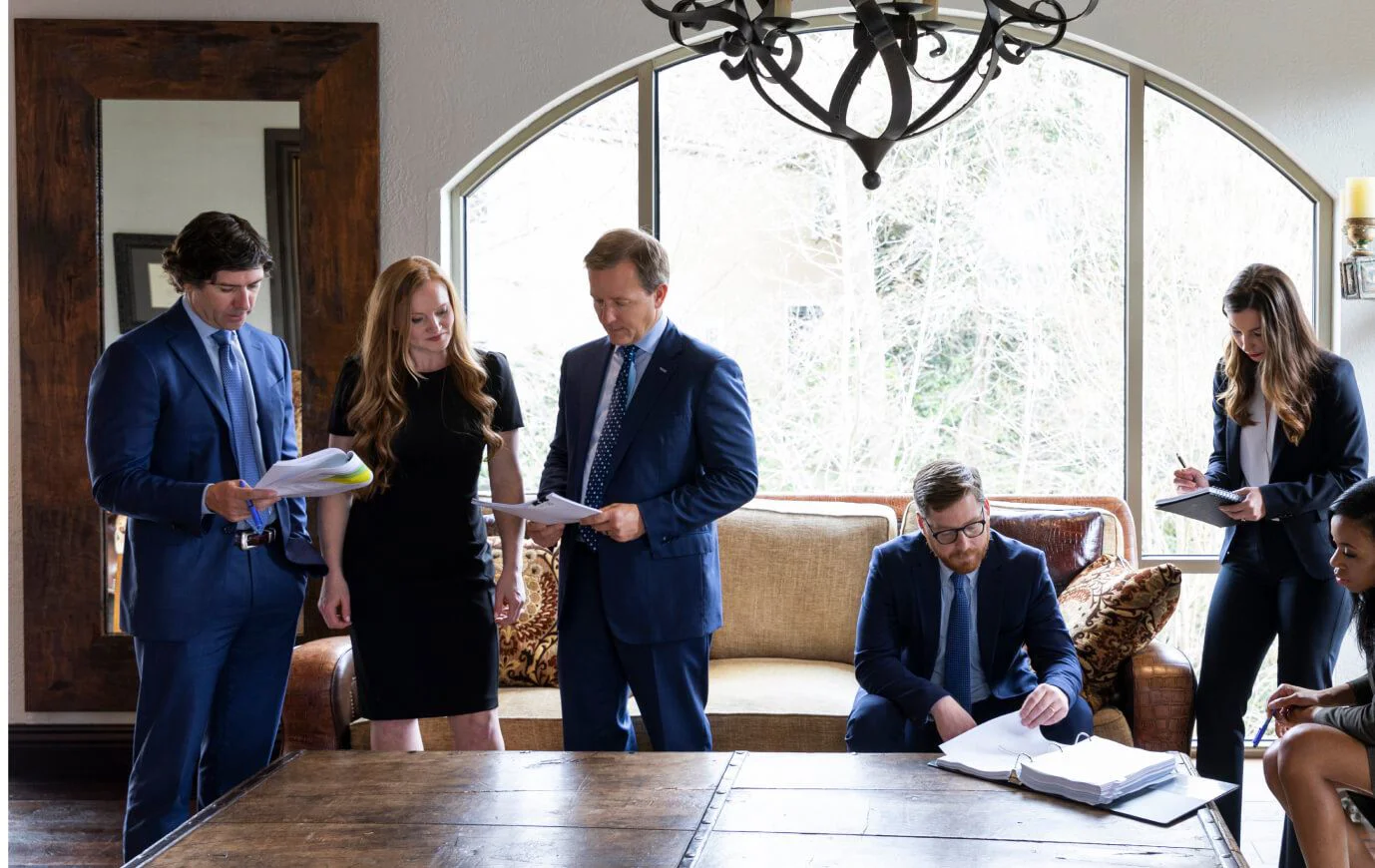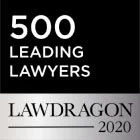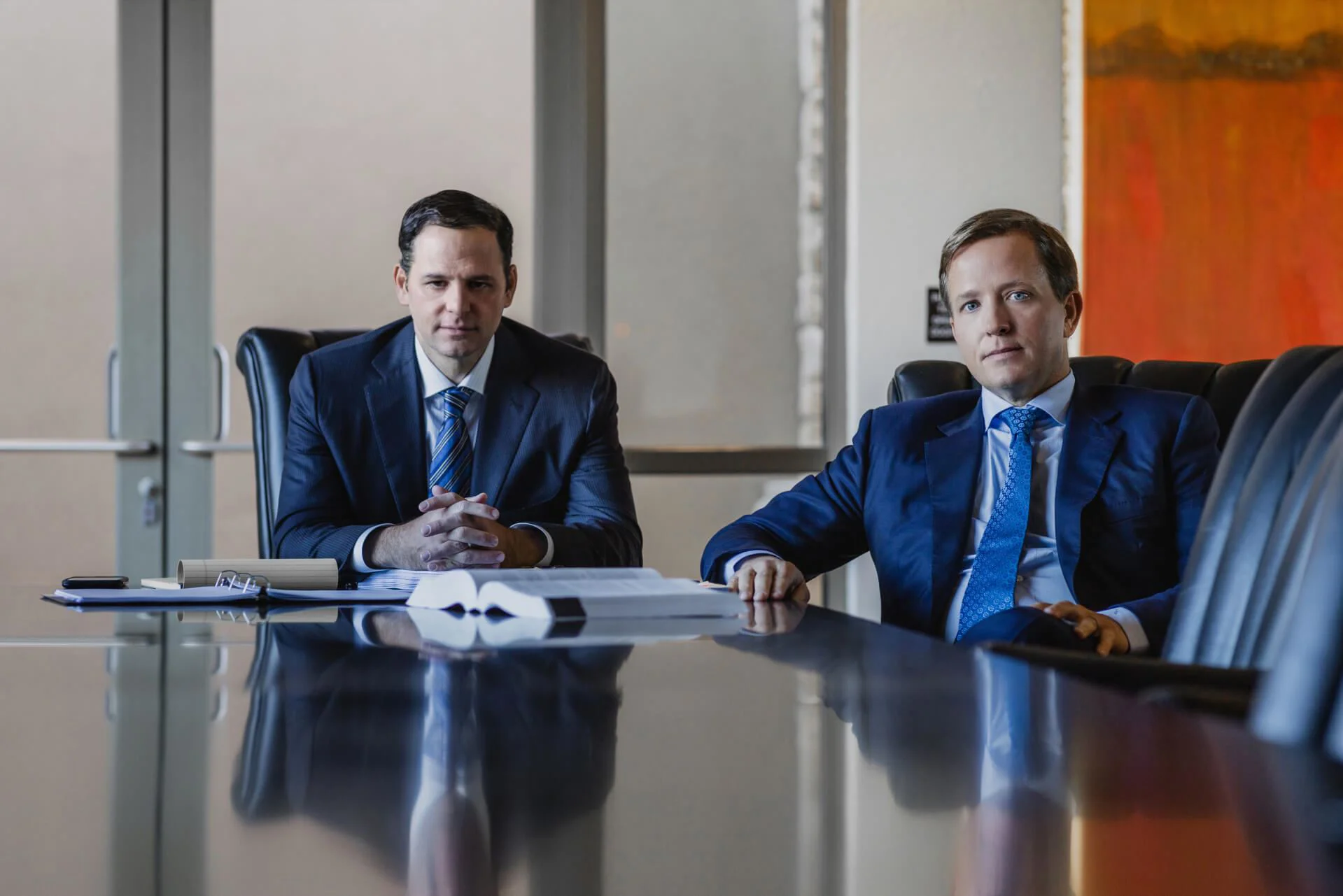Top-Rated Texas Railroad Accident Attorneys
Industrial shipping is built upon the nation’s railroad network, but when companies prioritize profits over safety or maintenance, people get hurt. Our job is to make sure those people have everything they need to get back on their feet while forcing the companies at fault to change their behavior. We live for a challenge because it represents a chance to make our clients’ lives better. That’s why we never stop fighting.
Arnold & Itkin has been at the forefront of investigating train accidents and other disasters for over two decades. We’ve secured over $20 billion for victims of life-altering catastrophes nationwide, addressing their medical treatment and ongoing care, replacing lost wages, and helping them face the future with confidence.
Our Texas railroad accident law firm handles cases involving:
- Hazardous material exposure
- Train derailments
- Conductor negligence
- Railroad crossing accidents
- Railroad worker injuries
- Fatal train accidents
Train accident survivors face the worst circumstances of their lives. It is our firm’s duty to not only provide aggressive representation but to ensure our clients get the best care and largest recoveries possible. The stakes are high: the money we win for our clients is often all they’ll have to live on for the rest of their lives.
Our Houston train accident attorneys don’t stop until we’ve reached the best possible result for our clients. No matter what.
Unmatched Success in Train Accident Cases
Our Houston, TX firm represented a woman who was struck by a Union Pacific train. After becoming separated from her friends during a night out, she was resting near some railroad tracks. Minutes later, a train approached. The operators of the train saw her unmoving body on the tracks but made no attempt to stop the train. Our client lost her leg and multiple fingers and suffered severe brain damage as a result of the incident.
Our Texas railroad accident lawyers worked tirelessly to build a case that proved the train operators could have avoided striking our client if they had taken proper action.
The jury awarded our client $557 million, a level of compensation that will provide for her lifelong care.
Arnold & Itkin's other notable train accident achievements include:
- $25 million settlement for the widow of a railroad worker
- $6 million settlement after a fatal train accident
- $4.77 million settlement for an injured railroad worker
- $3.9 million settlement for an injured railroad construction worker
- $2.55 million settlement for a man nearly hit by a runaway ballast regulator
- $1.25 million settlement for an injured railroad worker
- $1 million settlement for a worker injured at a railroad crossing
View all of our case results here.
Train & Railroad Crossing Accidents in Houston
One empty passenger car, the lightest type of train car, weighs around 80,000 pounds. One diesel locomotive, the type that pulls freight across the country, can weigh as much as 200,000 pounds. Some models weigh 400,000 pounds. At any speed, the sheer force of a locomotive can devastate anything in its path. It is virtually impossible to walk away from a train collision without life-altering or fatal injuries.
Out of all train and railroad incidents, crossing accidents are usually the most devastating, causing catastrophic injuries or death.
In 2022, 827 people were injured—either as drivers, passengers, or pedestrians—in train accidents at railroad crossings. 269 people were killed in crossing accidents. National Highway Traffic Safety Administration (NHTSA) motor vehicle accident statistics paired with Federal Railroad Administration (FRA) statistics reveal that “a motorist is 20 times more likely to die in a crash involving a train than...with another motor vehicle.”
Where Trains Operate in Houston
Houston is one of the busiest train hubs in the country. Major freight carriers like Union Pacific, BNSF, and Kansas City Southern operate in the region, moving thousands of railcars through Harris County to support the Port of Houston, petrochemical operations, and major industrial centers all the way from Pasadena to Greenspoint. Houston's light rail system, provided by Amtrak and METRORail, moves passengers throughout the city.
Many of Houston's rail lines intersect with public roads at grade-level crossings, places where commuters, pedestrians, trucks, and buses interact directly with moving trains. The City of Houston's Train Watch tool gives residents real-time insights about these crossings, identifying which intersections are blocked or active.
Houston's Train Watch highlights dozens of monitored crossings throughout the city, including high-traffic areas such as:
- Yale Street at the Heights Line
- Navigation Boulevard and Lockwood
- Commerce Street near Downtown Houston
- Hardy Street and Crosstimbers
- Mykawa Road in Southeast Houston
These crossings are part of why Houston sees a higher-than-average number of train-related injuries and delays. Long freight trains can block intersections for extended periods, and sudden track activity can put drivers, cyclists, and pedestrians at risk if warning systems malfunction or companies fail to maintain safe crossings.
The Causes of Railroad Crossing Accidents
As large and heavy as they are, not to mention the fact that they operate on set tracks, trains cannot change speed or direction in enough time to avoid imminent collisions at crossings. This does not mean that motorists are always at fault for crossing accidents, however. It also does not mean that it is always the train conductor who is to blame. Each incident is unique and must be thoroughly investigated to determine its cause.
In some cases, the design of the crossing itself is the deciding factor.
If trains require over a mile to brake, then crossings should give conductors a mile of clearance. More practically, each crossing should have a warning system for drivers well before the train is in sight. Although trains almost always have the right of way, there are times when a crossing may be deemed a unique and local safety hazard, thus requiring the railroad to take additional steps to safeguard motorists.
In deciding whether a crossing is a safety hazard, a jury may consider if:
- Federal regulations would require additional warnings
- Sight distances or visibility are reduced at the crossing
- There are intersections with other roads near the crossing
- There is visual clutter at the crossing
- There had been prior accidents at the crossing
The design and maintenance of the crossing is but one of many factors our Houston train accident attorneys consider when investigating and building a client's case. This includes whether the crossing was “protected” or “passive.”
Protected vs. Passive Railroad Crossings
Trains often intersect with roadways. In fact, there are more than 250,000 roadway and railroad crossings across the country, and approximately 96% of all accidents occur at these. Nearly 62,500 of these crossings do not have a light or gates.
Figures from the National Transportation Safety Board state that approximately 60% of all railroad crossing fatalities occur at “unprotected” or passive crossings. Passive crossings are those with no more than a railroad crossing sign. The statistics also state that “protected crossings,” those crossings with warning devices such as lights and gates, represent only 20% of the public railroad crossings in the U.S.
Catastrophic Injuries Linked to Train Accidents
When a 200‒ton locomotive collides with a vehicle or a speeding freight train derails, the human body absorbs forces it was never designed to withstand. Survivors often face catastrophic injuries that require years of treatment and permanent lifestyle changes.
Victims of a train or railroad accident may experience:
- Traumatic brain injuries caused by the force of impact or head trauma that can severely limit their ability to reason, communicate, and function independently.
- Spinal cord damage, which can result in permanent conditions such as paraplegia or quadriplegia and leave them in need of lifelong support and care.
- Complex orthopedic fractures requiring repeated surgeries and rehabilitation, also potentially limiting mobility and the ability to perform certain tasks or functions.
- Severe burns from diesel-fuel fires or chemical releases at the scene of a collision, which can cause scarring, nerve damage, and muscle damage.
- Crush injuries and amputations caused by jackknifed railcars or shifting cargo, permanently impacting their ability to work and perform normal activities.
- Blast-wave concussions and lacerations, which may affect passengers or workers outside immediate danger zones, often from flying debris.
A seasoned Houston train accident lawyer can work with trauma surgeons, life‒care planners, and vocational experts to calculate the full cost of these injuries: hospitalization, future surgeries, adaptive equipment, lost income, and the day‒to‒day assistance many victims will need for the rest of their lives.
By presenting a complete picture of the medical and economic impact of a train accident, we make sure railroad companies and their insurers can’t downplay what our clients have endured.
Types of Compensation Available After a Train Accident
In a railroad accident case, “compensation” means far more than paying the ambulance bill. As a proven train accident firm in Houston, our goal is to secure every dollar necessary for a lifetime of recovery, financial stability, and dignity. Depending on the facts of your accident—whether you were a railroad employee covered by FELA, a motorist at a crossing, or a bystander injured in a derailment—you may be entitled to:
Past & Future Medical Expenses
This may include all costs related to medical care, including emergency treatment, hospitalization, surgeries, rehabilitation, prosthetics, prescription medications, home health services, and even travel costs to and from appointments.
Loss of Earnings & Diminished Earning Capacity
When the injuries sustained in a train accident affect your ability to work and earn a living, you may be able to recover compensation for this, including wages already missed, plus the income you are likely to lose over the rest of your career.
Life-Care & Home Modifications
Catastrophic railroad injuries require significant adjustments to one's home and lifestyle. You may seek compensation for wheelchair ramps, specialized vehicles, full-time attendants, and any adaptive equipment required for living with a permanent injury.
Pain, Suffering & Emotional Distress
A serious accident, especially a traumatic one like a crossing accident or train collision, has an emotional toll. Survivors may deal with significant issues like chronic pain, PTSD, anxiety, depression, and loss of independence caused by the accident.
Disfigurement & Loss of Enjoyment of Life
If a railroad accident left you dealing with permanent changes like scarring, amputation, or other injuries that affect appearance, prevent you from doing the things you once loved, or perform daily tasks, you may be able to seek compensation for this.
Punitive Damages
When a railroad or third party acts with gross negligence or wrongdoing, such as ignoring maintenance schedules or falsifying inspection records, punitive damages may be awarded as a form of punishment and to deter similar conduct by others.
Wrongful Death Damages
After a fatal train accident, financial compensation may be sought for the wrongful death of a spouse, child, parent, or other loved one. This may include damages for funeral expenses, loss of financial support, and loss of companionship, care, and guidance.
There is no way to go back and prevent a train accident from happening in the first place, but a fair and complete recovery can help you and your family rebuild. It can lay the foundation for a more stable future. It can also bring peace of mind knowing that at-fault parties have been held accountable.
A seasoned train accident lawyer in Houston from Arnold & Itkin can assemble medical experts, economists, and life‒care planners to prove the full value of your case—then fight relentlessly until the railroad and its insurers pay every cent the law allows.
Proving Fault & Maximizing Compensation
Railroad operators will not willfully admit wrongdoing. They will blame motorists for “beating the gate,” fault engineers for split‒second decisions, or hide behind federal preemption laws. An experienced Texas railroad accident attorney can counter those tactics with an immediate, aggressive investigation.
Our team secures event‒data recorders (the train’s “black box”), downloads locomotive camera footage, and subpoenas maintenance logs before critical evidence can be lost or destroyed. We inspect crossing signal circuitry, measure sight distances, and bring in experts to determine what caused the accident.
For injured railroad employees, we file Federal Employers’ Liability Act (FELA) claims that require only a showing of slight negligence to hold the carrier liable. For motorists, pedestrians, or nearby residents, we pursue traditional negligence or wrongful death actions, often uncovering design flaws at passive crossings, outdated brake systems, or engineer fatigue caused by punishing work schedules. We then demand compensation for every category of loss available under Texas law—medical bills, future care, lost earning capacity, pain and suffering, and, when a railroad’s conduct is reckless, punitive damages designed to change corporate behavior.
That relentless approach is why clients across the Gulf Coast turn to Arnold & Itkin when they need a Houston train accident lawyer who won’t back down.
What To Expect When You Call Our Firm
If you or someone you love has recently suffered harm in a railroad accident, trying to figure out what to do next can seem impossible. Understanding what will happen when you reach out to Arnold & Itkin can give you peace of mind as you begin this process. Our approach is designed to build trust, offer direct answers, and make every step as clear as possible from the very first conversation.
When you contact us to discuss your case, we will listen carefully so we can quickly learn the specifics of your situation and provide the right guidance. As local train accident lawyers in Houston, we know the railroad operators in the area, we know the crossings, and we know what often goes wrong. We use this knowledge as we begin investigating and building a case. Plus, our familiarity with area hospitals, like Ben Taub and St. Joseph Medical Center, allows us to better coordinate follow-up care if needed.
Here's how our process typically starts::
- Free, confidential consultation with a member of our team who will take the time to listen, answer questions, and review your situation.
- Immediate investigation of the train or railroad accident by gathering police reports, speaking to witnesses, and examining local rail operator records.
- Clear explanation of your rights and options, including how a Houston railroad injury lawyer can help you pursue damages under Texas law.
- Plan for next steps to protect your rights, set goals for recovery, and move your case forward so you can your family can face a brighter future.
No matter where your accident occurred in the Houston area, we are committed to making the process accessible and answering your concerns—whether about medical care, insurance, or what comes next. By choosing Arnold & Itkin, you have a dedicated team on your side from day one.
Our Houston Railroad Accident Lawyers' Strategy for Success
If an accident makes the news, we get the call. People entrust us with the country’s biggest cases because they know we’ve been in these situations before. We fought and won for the crew of the Deepwater Horizon, the victims of Johnson & Johnson’s faulty medication, and the workers who lived through the nation’s biggest plant explosions.
People call our Texas injury attorneys because we are willing to take on any opponent and put in the work it takes to win. We fight because it’s the right thing to do.
You might be facing the worst circumstances of your life right now. We understand because we’ve walked through it with people in similar situations. We helped them get the care they needed, gave them advice about how to move forward, talked them through what to expect, and pulled them back onto their feet. That’s what it means to fight for someone. We’ve secured more than $20 billion for our clients, which is only possible because we take every story personally. No matter what.
If you were injured or lost someone you love, contact our Houston train accident attorneys now for a free consultation.

























